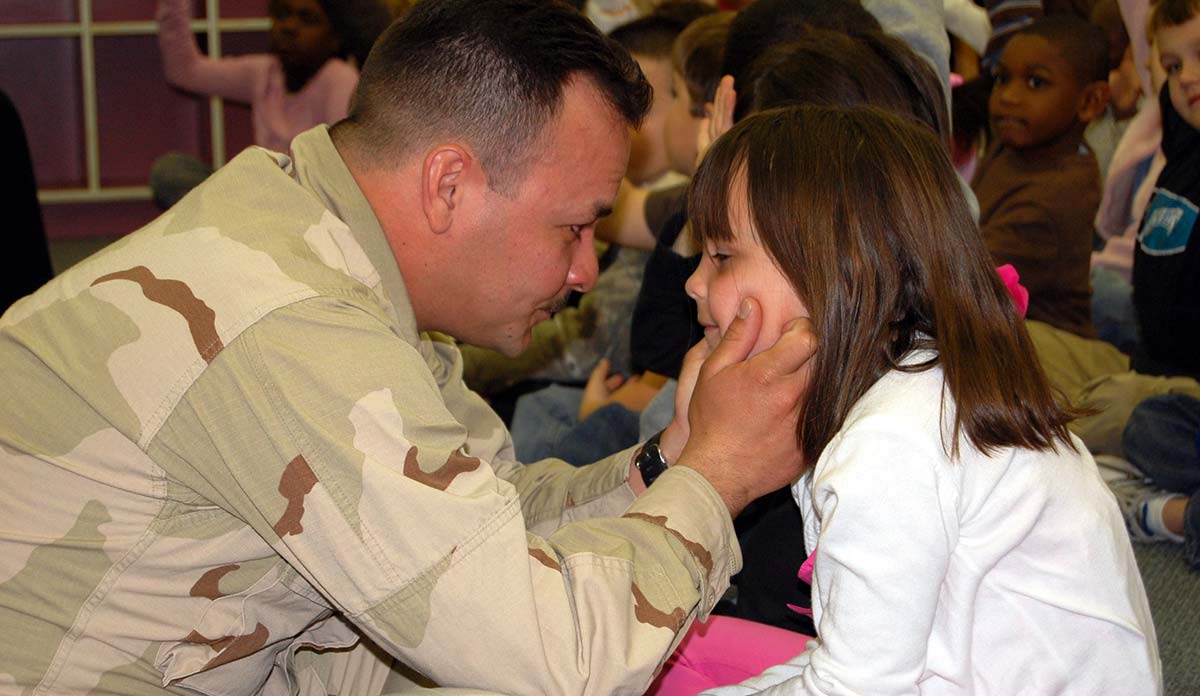Today we reflect on the service and honor the sacrifice of members of the military . Many of them have families whose service and sacrifice at home should be acknowledged and honored as well. Dr. Renée Spencer is a professor at the Boston University School of Social Work involved in a project focused on helping all members of military families. Along with a team of colleagues (Timothy Cavell, PhD (PI), University of Arkansas; Amy Slep, PhD, New York University; Janet Heubach, PhD, Mentoring Works Washington; Carla Herrera, PhD, Independent Researcher), and in partnership with the North Thurston Public Schools and Big Brothers Big Sisters of Southwest Washington, Dr. Spencer is developing a model for programs to link military students with mentors.
Dr. Spencer’s work, which is funded by the Institute of Education Sciences, grew out of the recognition that when a parent serves in the military, the whole family also serves. Across the United States, nearly 2 million children live in military families, and the Military Student Mentoring project is working to assess how best to support those children.
Reducing Predictable Stress
Dr. Spencer is very clear that the goal of Military Student Mentoring is to increase the supports available to all children and families experiencing the predictable stress accompanying parental deployment and military service rather than targeting struggling students. Her team of researchers has developed a model to provide weekly in-school mentoring to military students in a pilot school district in Washington State. They are assessing both whether the model works to connect military students with mentors and ultimately what the impact on military students is of having a mentor.
The project’s approach includes a core commitment to understanding and incorporating military culture into the service model. Military families tend to be resilient and fiercely independent in meeting their own needs, despite the challenges of frequent moves, extended episodes of parenting without a partner, and supporting children’s experiences of parental deployment. The Military Student Mentoring project acknowledges and respects these military family strengths and therefore focuses on providing additional support aimed at reducing the widespread, normative stress military students experience related to parental deployment.
The positive reception of Military Student Mentoring may be rooted in precisely this attention to the particular needs, preferences, and experiences of military families. Locating the core mentoring intervention in schools is one example. Dr. Spencer noted military families themselves identified schools as a critical source of community knowledge and resources. “With the frequent moves that they make, they don’t have a ready-made network to inquire about what are the safe, good, supportive services in the community… We learned…that the schools were a pretty good place to do this because that’s a place that the families are already connected to, there’s a level of trust in schools, because adults are screened and supervised…services offered through schools are pretty safe bets.”
Respecting Families’ Narratives
Military Student Mentoring has tapped into critically important perspectives provided by military families themselves about their openness to and interest in additional, safe, supportive adults in their children’s lives and, importantly, disinterest in outside rescuers or “fixers” of their daily reality. And in addition to these key elements of the program’s model, the importance of shared and family-specific culture is incorporated into training provided to the mentors. Dr. Spencer offered a compelling example of this sensitization to the particular needs of military families:
“One of the big factors these families shared with us was, they have stories that they tell their young kids about what a deployment is, and they don’t want adults coming in and disrupting that story. So it might be, ‘daddy’s working building schools overseas, and he’ll be home in a few months.’ And when an adult who doesn’t understand this hears the word deployment, they might start saying, ‘well are you afraid, are you worried about your dad,’ and that’s not what these families want.”
With the frequent moves that they make, they don’t have a ready-made network to inquire about what are the safe, good, supportive services in the community… We learned…that the schools were a pretty good place to do this because that’s a place that the families are already connected to, there’s a level of trust in schools, because adults are screened and supervised…services offered through schools are pretty safe bets.
The Project draws on the family and deployment narratives which military parents identified to the researchers to tailor how mentors are trained. Mentors are educated about military culture generally and families’ particular choices in helping their children understand their unique context. As Dr. Spencer explains, “it really is that sense of trying to heighten mentors’ awareness they need to tread lightly and try to understand how this family has framed a deployment experience, or how they’re framing a move, and follow that family’s lead.”
Impacting Stress and Support
While Military Student Mentoring is still very much an ongoing project, it’s had early, anecdotal success, such as the positive experiences some students have shared and which you can see here. Over the longer term, the project is hoping to see specific, positive impacts on children and families. For instance, military students may feel more connected to their schools – an important outcome for children who move on average between six and nine times while school age. They may also experience a higher sense of social support particularly related to school, as their mentor can represent someone who is reliably supportive of and present for them in the school context. Beyond these child-level impacts, Military Student Mentoring is assessing whether engagement in the program could reduce stress more broadly for the whole military family. Anecdotal evidence from other programs serving military families suggests military parents can feel relief and support when they know and trust that there is another reliable adult who is committed to and aware and supportive of their child.
Creating a Model to Support Families
If Military Student Mentoring can accomplish some of these hopeful outcomes, the program model it is testing could be broadly applied and have beneficial impacts on military families across the country – and the world. As Dr. Spencer noted in closing, “ It’s both humbling and incredibly inspirational to do this work. You see up close the sacrifices that everybody in the family is making when somebody is serving our country in this way, and…it’s a real honor and privilege to be a part of a project that’s trying to offer supports to those folks.”
Feature image: DVIDSHUB, Father, Daughter Reunite. Navy Visual News Service. Photo by Kaylee LaRocque, used under CC BY 2.0. Electronics technician Petty Officer 2nd Class Sam HerediaPerez greets his 7-year-old daughter during a special reunion at Dinsmore Elementary School. HerediaPerez, assigned to the naval Air Station Jacksonville Air Operations Ground Electronic Maintenance Division, has been deployed to Afghanistan as an individual augmentee for the past nine months.













